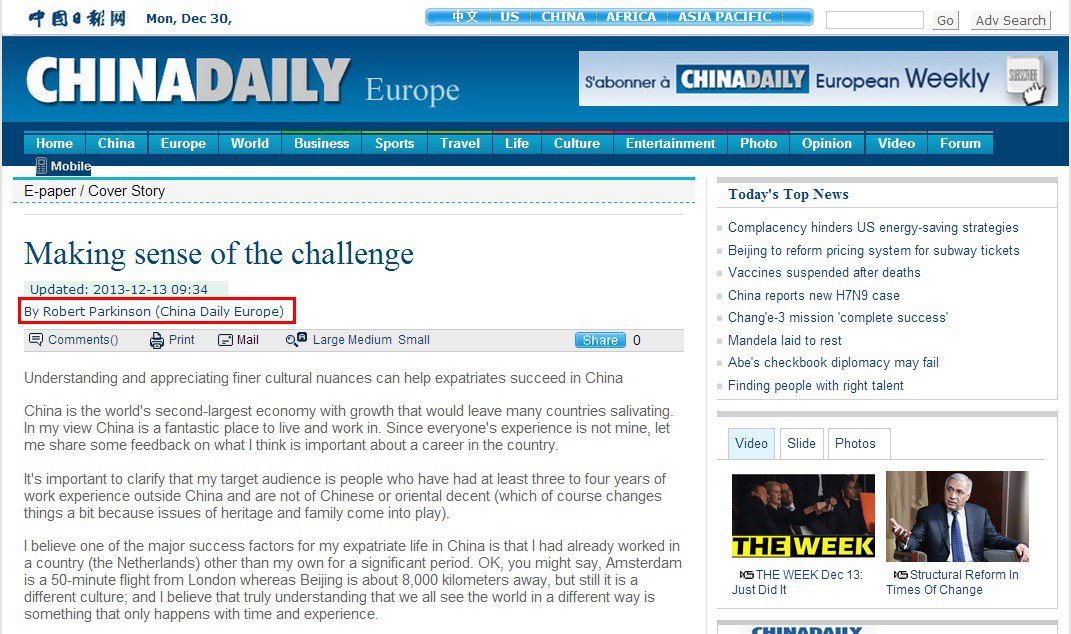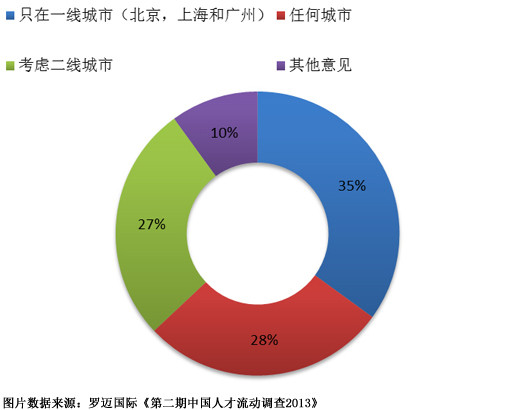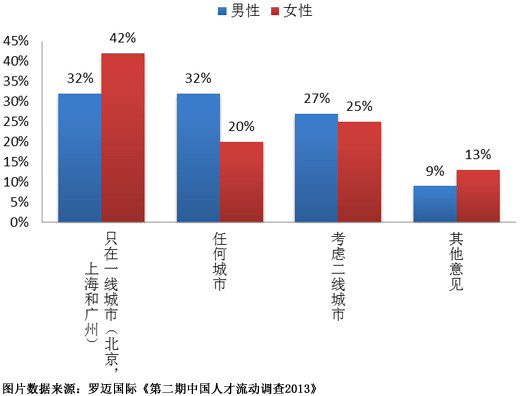Tag Archives: Robert Parkinson
你在哪你会吸引谁?
- Tuesday, 07 January 2014 03:36

Making Sense of The Challenge of A Big Move
- Monday, 30 December 2013 08:58


China is the world’s second-largest economy with growth that would leave many countries salivating. In my view China is a fantastic place to live and work in. Because everyone’s experience is not mine, let me share some feedback on what I think is important about a career in the country.
It’s important to clarify that my target audience is people who have had at least three to four years of work experience outside China and are not of Chinese or oriental decent (which of course changes things a bit because issues of heritage and family come into play).
I believe one of the major success factors for my expatriate life in China is that I had already worked in a country (the Netherlands) other than my own for a significant period. OK, you might say, Amsterdam is a 50-minute flight from London whereas Beijing is about 8,000 kilometers away, but still it is a different culture; and I believe that truly understanding that we all see the world in a different way is something that only happens with time and experience.
I have seen many examples of expatriates in China landing in Beijing or Shanghai with the “I’ll get ‘them’ to do it our way (!)” mentality, and then slowly but surely their confidence wanes. Successful laowai realize that you will never change a culture thousands of years old, no matter how convincing you are. It is far better to understand and appreciate it.
The second, but perhaps most important tool for foreigners to do well in China is language. I can list at least 10 examples of people I know well who have enjoyed accelerated careers (in China) simply because they’ve made the effort to get to grips with Mandarin at a fluent or semi-fluent level. When I was at school in the 1980s and early 90s, there was tremendous emphasis on the European Initiative (basically, pupils from the age of 10 upwards were all taught German) which has since been quietly replaced with Mandarin.
Interestingly, learning English is also the most important advice I give to young Chinese people. I know many Chinese professionals who’ve done very well simply because they speak English fluently.
Staying with the practical and financial perspective for a second, the next most important element for foreigners – both early- and mid-career – is to be sent to China. Packages for the talented are still good and managers in disciplines such as finance, law and general management can expect tax equalization, paid apartments and schooling for children on top of hefty base salaries and bonuses (of course you have to perform, otherwise you’ll certainly be replaced).
I compare this with foreigners who move jobs within China who almost certainly will not get perks such as schooling and housing – and will probably be awarded a “local plus” package, or just a comparable package to a person from the local market.
Alongside expatriation, of course one has to understand that the expectations set at the beginning of an expatriate assignment in terms of timing have very little bearing on reality: three-year assignments quite often turn in to 10/15 plus year relocations. Why? Because for the vast majority of people working here, it takes at least two to three years to get used to life. At that point, most companies want to see a return on these investments so usually they prefer their managers to stay longer (if they’re good).
Finally, moving more toward the profound, one should consider such factors as: Are you genuinely interested in Chinese culture? Life is much easier if you are. Are you coming because you believe China is something of a magic cash machine? It isn’t. Are you prepared for the cultural differences? Read. Have you anticipated the problems? Ask.
There is a lot written about China, which is valid and useful, and equally a lot, which is based on prejudice, hearsay and speculation. Above all, do yourself a favor and come here for a week, there are thousands of travel options now, so come and explore, meet people and decide whether or not the challenge is for you, because above all else China is without doubt exactly that: a challenge.
The author is founder and managing director of RMG Selection, an Asia-focused human resources and recruitment consultancy.
Read the original version at: China Daily USA More information: RMG SelectionMaking Sense of The Challenge
- Monday, 30 December 2013 08:54

 Understanding and appreciating finer cultural nuances can help expatriates succeed in China
China is the world’s second-largest economy with growth that would leave many countries salivating. In my view China is a fantastic place to live and work in. Since everyone’s experience is not mine, let me share some feedback on what I think is important about a career in the country.
It’s important to clarify that my target audience is people who have had at least three to four years of work experience outside China and are not of Chinese or oriental decent (which of course changes things a bit because issues of heritage and family come into play).
I believe one of the major success factors for my expatriate life in China is that I had already worked in a country (the Netherlands) other than my own for a significant period. OK, you might say, Amsterdam is a 50-minute flight from London whereas Beijing is about 8,000 kilometers away, but still it is a different culture; and I believe that truly understanding that we all see the world in a different way is something that only happens with time and experience.
I have seen many examples of expatriates in China landing in Beijing or Shanghai with the “I’ll get ‘them’ to do it our way (!)” mentality, and then slowly but surely their confidence wanes. Successful laowai realize that you will never change a culture thousands of years old, no matter how convincing you are. It is far better to understand and appreciate it.
The second, but perhaps most important tool for foreigners to do well in China is language. I can list at least 10 examples of people I know well who have enjoyed accelerated careers (in China) simply because they’ve made the effort to get to grips with Mandarin at a fluent or semi-fluent level. When I was at school in the 1980s and early 90s, there was tremendous emphasis on the European Initiative (basically, pupils from the age of 10 upwards were all taught German); which has since been quietly replaced with Mandarin.
Interestingly, learning English is also the most important advice I give to young Chinese people. I know many Chinese professionals who’ve done very well simply because they speak English fluently.
Staying with the practical and financial perspective for a second, the next most important element for foreigners – both early and mid-career – is to be sent to China. Packages for the talented are still good, and managers in disciplines such as finance, law and general management can expect tax equalization, paid apartments, and schooling for children on top of hefty base salaries and bonuses (Of course you have to perform, otherwise you’ll certainly be replaced).
I compare this with foreigners who move jobs within China who almost certainly will not get perks such as schooling and housing, and will probably be awarded a “local+” package, or just a comparable package to a person from the local market.
Alongside expatriation, of course one has to understand that the expectations set at the beginning of an expatriate assignment in terms of timing have very little bearing on reality: three-year assignments quite often turn in to 10/15+ year relocations. Why? Because for the vast majority of people working here, it takes at least two to three years to get used to life, and at that point, most companies want to see a return on these investment so usually they prefer their managers to stay longer (if they’re good).
Consider also that life in China offers a very high standard of living, buzz, excitement and rapid change when compared with the relative mundanity of cities, certainly in Western Europe. There aren’t many people I know who look forward to going home, and indeed, Westerners I know often retire to more developed Asian cities such as Hong Kong or Singapore.
Finally, moving more toward the profound, one should consider such factors as: are you genuinely interested in Chinese culture? Life is much easier if you are. Are you coming because you believe China is something of a magic cash machine? It isn’t. Are you prepared for the cultural differences? Read. Have you anticipated the problems? Ask. These are all questions which need addressing, and will make whichever decision you eventually take far more concrete and assured.
I’ve worked in China now for almost 10 years. I never expected to be here this long, but I love (nearly) every second and have made my life here. I would encourage anyone who’s intrigued to seriously explore a life in this gargantuan country, as there is no mistaking the significance of China in today’s world order, and for the right people there are some very serious opportunities here.
There is a lot written about China, which is valid and useful, and equally a lot, which is based on prejudice, hearsay and speculation. Above all, do yourself a favor and come here for a week, there are thousands of travel options now, so come and explore, meet people and decide whether or not the challenge is for you, because above all else China is without doubt exactly that: a challenge.
The author is founder and managing director of RMG Selection, an Asia-focused human resources and recruitment consultancy.
Read the original version at: China Daily Europe
More information: RMG Selection
Understanding and appreciating finer cultural nuances can help expatriates succeed in China
China is the world’s second-largest economy with growth that would leave many countries salivating. In my view China is a fantastic place to live and work in. Since everyone’s experience is not mine, let me share some feedback on what I think is important about a career in the country.
It’s important to clarify that my target audience is people who have had at least three to four years of work experience outside China and are not of Chinese or oriental decent (which of course changes things a bit because issues of heritage and family come into play).
I believe one of the major success factors for my expatriate life in China is that I had already worked in a country (the Netherlands) other than my own for a significant period. OK, you might say, Amsterdam is a 50-minute flight from London whereas Beijing is about 8,000 kilometers away, but still it is a different culture; and I believe that truly understanding that we all see the world in a different way is something that only happens with time and experience.
I have seen many examples of expatriates in China landing in Beijing or Shanghai with the “I’ll get ‘them’ to do it our way (!)” mentality, and then slowly but surely their confidence wanes. Successful laowai realize that you will never change a culture thousands of years old, no matter how convincing you are. It is far better to understand and appreciate it.
The second, but perhaps most important tool for foreigners to do well in China is language. I can list at least 10 examples of people I know well who have enjoyed accelerated careers (in China) simply because they’ve made the effort to get to grips with Mandarin at a fluent or semi-fluent level. When I was at school in the 1980s and early 90s, there was tremendous emphasis on the European Initiative (basically, pupils from the age of 10 upwards were all taught German); which has since been quietly replaced with Mandarin.
Interestingly, learning English is also the most important advice I give to young Chinese people. I know many Chinese professionals who’ve done very well simply because they speak English fluently.
Staying with the practical and financial perspective for a second, the next most important element for foreigners – both early and mid-career – is to be sent to China. Packages for the talented are still good, and managers in disciplines such as finance, law and general management can expect tax equalization, paid apartments, and schooling for children on top of hefty base salaries and bonuses (Of course you have to perform, otherwise you’ll certainly be replaced).
I compare this with foreigners who move jobs within China who almost certainly will not get perks such as schooling and housing, and will probably be awarded a “local+” package, or just a comparable package to a person from the local market.
Alongside expatriation, of course one has to understand that the expectations set at the beginning of an expatriate assignment in terms of timing have very little bearing on reality: three-year assignments quite often turn in to 10/15+ year relocations. Why? Because for the vast majority of people working here, it takes at least two to three years to get used to life, and at that point, most companies want to see a return on these investment so usually they prefer their managers to stay longer (if they’re good).
Consider also that life in China offers a very high standard of living, buzz, excitement and rapid change when compared with the relative mundanity of cities, certainly in Western Europe. There aren’t many people I know who look forward to going home, and indeed, Westerners I know often retire to more developed Asian cities such as Hong Kong or Singapore.
Finally, moving more toward the profound, one should consider such factors as: are you genuinely interested in Chinese culture? Life is much easier if you are. Are you coming because you believe China is something of a magic cash machine? It isn’t. Are you prepared for the cultural differences? Read. Have you anticipated the problems? Ask. These are all questions which need addressing, and will make whichever decision you eventually take far more concrete and assured.
I’ve worked in China now for almost 10 years. I never expected to be here this long, but I love (nearly) every second and have made my life here. I would encourage anyone who’s intrigued to seriously explore a life in this gargantuan country, as there is no mistaking the significance of China in today’s world order, and for the right people there are some very serious opportunities here.
There is a lot written about China, which is valid and useful, and equally a lot, which is based on prejudice, hearsay and speculation. Above all, do yourself a favor and come here for a week, there are thousands of travel options now, so come and explore, meet people and decide whether or not the challenge is for you, because above all else China is without doubt exactly that: a challenge.
The author is founder and managing director of RMG Selection, an Asia-focused human resources and recruitment consultancy.
Read the original version at: China Daily Europe
More information: RMG Selection
Something You Must Know about Layoffs in China
- Tuesday, 22 October 2013 10:00

by Robert Parkinson, CEO and Founder of RMG Selection
After the ‘Gradual Model’ program of enhanced early retirement was put forward last year, IBM decided to reduce cost by laying people off. For cutting down USD 1 billion costs, IBM plans to get rid of 6000 to 8000 employees. Many companies consider layoffs as one of the most efficient methods to save themselves. However, have you considered the questions below before you did it? How will massive layoffs influence companies in both short and long-term, and how should a company handle the process to reduce the negative consequences to the lowest level? It is always a tough problem for HR departments. Therefore, a professional plan with logical steps and enough communication are necessary when you are going to let people go.
The first step of massive layoffs is to make sure you know the targets. Obviously, enterprises would like to cut down on employees who work ineffectively or have low KPI. Based on the Chinese law, however, employees cannot be fired under the following circumstances:- Employees who have occupational disease.
- Female employees who are pregnant or in maternity leave.
- People who are disabled from working for your company.
- Employees who have worked in the company for more than 15 years and will retire in 5 years.
 In addition, psychologists are playing a more and more important role in a company, especially in the laying off process. Because of the high pressure in modern society, someone may be stressed out if he or she is dismissed. In this case, a psychologist is very necessary. The psychologist can talk with employees about their work burdens, what they worry about and what they care about most. Subsequently he can report these problems to the management department who should think carefully about how to solve these problems in a proper way.
Actually, some companies tend to use a third-party HR team help them to dismiss employees. Companies who choose this method avoid facing their employees directly. Ho
wever, how can a company expect a third party HR team to take all the responsibility? If the leaving employee feels unsatisfied about the process, they will not complain to the HR team, but to the company itself. Organisations cannot push all responsibilities away by hiring third-party HR teams to help them with layoffs.
In addition, psychologists are playing a more and more important role in a company, especially in the laying off process. Because of the high pressure in modern society, someone may be stressed out if he or she is dismissed. In this case, a psychologist is very necessary. The psychologist can talk with employees about their work burdens, what they worry about and what they care about most. Subsequently he can report these problems to the management department who should think carefully about how to solve these problems in a proper way.
Actually, some companies tend to use a third-party HR team help them to dismiss employees. Companies who choose this method avoid facing their employees directly. Ho
wever, how can a company expect a third party HR team to take all the responsibility? If the leaving employee feels unsatisfied about the process, they will not complain to the HR team, but to the company itself. Organisations cannot push all responsibilities away by hiring third-party HR teams to help them with layoffs.
How much is an MBA Worth asks Robert Parkinson, CEO of RMG International Business Consulting (Beijing) Co., Ltd
- Tuesday, 15 October 2013 05:49

‘The ticket to executive positions with a six digit salary’ has long been the tag on the MBA degree. MBA degrees contain a kind of magic that inspires a soaring expectation from the candidates. According to Poets and Quants collection of salary expectation of MBA candidates cross different countries, the US MBAs expect a 140 per cent raise for their MBA degree, a 148 per cent salary increase is expected from UK MBAs and a whopping 245 per cent salary raise is expected from Chinese MBA candidates. However, according to the talent flow survey conducted by RMG Selection in China, the average salary raise from job-hopping is 20 to 30 per cent, regardless the position level or the qualification of the job seekers. As unrealistic these expectations are, these rate rises do not come from nowhere.
The great story and the not so great reality
For years there has been a love story between the Wall Street Firms and the top MBA programmes graduates, making the MBA the ticket to investment banking and other top finance sectors. MBA candidates are immersed in misleading reports and stories that make them believe in the magic of MBA degree automatically getting them leadership positions.
However, even the love affair between Wall Street and Harvard MBAs didn’t survive the big financial meltdown of 2008. According to Poets and Quants, only 27 per cent of Harvard MBAs have been recruited into financial sectors this year, down from 35 per cent last year and 39 per cent in 2011. Also Bloomberg reported a continuous two year decline of MBA recruitment in all business schools with a recruitment rate of 70 per cent, down from 75 per cent last year. The hard reality also plays out for Chinese MBAs. Because of the bad employment conditions of China this year, 25 per cent of MBAs postponed their graduation – as reported by Hexun news. If that wasn’t bad enough, the private sector in China claimed that they were not recruiting MBAs because of the high hiring cost.
Facing the not so great reality, it is important for MBA candidates to sort their priorities of what is important in a job instead of relying on the authority of the degree or those outdated stories. Candidates also need to remember that the cost of gaining an MBA exceeds the amount required for fees. Actual cost is significantly higher since it includes cost of living expenses, foregone salary and other opportunity costs such as a perspective promotion. And even having paid that cost a candidate’s return on investment is far from certain time-wise. According to the China Talent Flow Survey of 2013 by RMG Selection, the response rate of online resume application of MBAs does not show any radical difference from that of experienced bachelors over a six month period. The brand equity added simply from the privilege of an MBA degree is therefore not as dramatic as candidates imagine. Put simply, MBAs are not rewarded more money because of their degree.
Recruiters: the Checklist for hiring an MBA
Facing such high salary anticipations of MBA talents, it is very important that recruiting companies make meticulous hiring decisions between an MBA and an experienced professional and have a clear and specific recruitment need. The following are a checklist recommended to HR facing MBA recruitment:
1: Does this position really need MBA credential?
An MBA is not the must for every higher position. Most consultancies prefer their candidates to have an MBA because the jobs require critical management and leadership skill. Also the networks created from the MBA programs could benefit the company in the terms of Business Development. Also for above director level position, an MBA candidate is recommended because the executive management plays a crucial role for these positions. On the other hand for more technical and specialized positions, such as a Head Engineer or the R&D manager, it is the expertise in the specific field that is most valuable. The MBA credential does not differentiate one candidate from another.
2: What type of MBA program is candidate enrolled in?
Most hiring managers or HRs focuses on the school where the MBA degree is issued. Recruiters are likely to neglect the type of MBA program the candidate participates. Most candidates will not list the type of MBA program they are enrolled in on the resume unless it is a full time MBA program. Therefore, additional questions need to be asked even if the candidates graduated with a Harvard MBA.
Typically, there are three types of MBAs:
• The two year full time MBA
• Part time MBA
• Online MBA
Most universities have the first two programs but some community college or specialised MBA education institution offers the MBA courses online. The MBA experience varies through different type of programs candidates are enrolled in. The full time MBA engage candidates to study, practice and networking with their classmates and annulus. Due to less time commitment, the part time MBA may not guarantee the engagement in the course learning but the daily work practice is also likely to lift the practical benefits that candidates get from the courses. It is also worth mentioning that there are different variations in MBA programs, such as International MBA, Overseas MBA and EMBA, which all have different focuses in terms of function, industry and courses.
3: Can the MBA education add practical value to the candidate and the company?
MBA degree on the resume should only boost their chances to get interviewed but not their chances to get hired. One of the most valued benefits from MBA education is the range and quality of network MBAs are likely to have after your graduation, especially if they are graduating from one of the top programs. However, the networks will lose its value when the candidate does not have enough networking and relationship management skills. It is important to learn about how the candidates practice what they have learned from the courses or cases into real business practices before you made the decisions to pass all the other candidates.
4: Can you afford an MBA?
From a financial perspective, though MBAs expectation to have a more than 140 per cent salary raise is not realistic, recruiters do need to understand and manage MBA graduates’ expectations. It is crucial for recruiters to set up clear and firm offer ceiling, the highest or the most costly offer package that the company can afford, during the salary negotiation because it is very likely for recruiters to end up with a higher planned salary for an MBA than a normal experienced professional.
From a management perspective, although recruiters are most likely to hire an MBA for a managerial position, the team dynamic should also be taken into consideration. There is a risk to hire a manager rather than internal promotion due to the possible disruption of the team effectiveness. If the MBA is not the right leader for the team, there are possibilities to lose one of the former employee or the MBA talent after all and affect the efficiency of the whole department.
5: Make your retention plan effective.
No company wants a quick turnover of their management team. Therefore, if you have MBA candidates entered your final round of interviews, it is important to make the retention plan before you make the actual hiring decisions because it is very likely that you are going to employ an MBA. Besides the salary raise and a good title, MBA candidates also have high expectation of their career development. A detailed career development plan not only increase the chance of the candidates accept the offer but also controls your internal position turnover and human resource planning, especially when you have decided to hire an MBA.
Also, after you have hired an MBA manager, certain support is needed in order to make the transition. For instance, it is recommended to arrange a senior manager to mentor the MBA to fit in the team dynamic and coordinate the subordinates as well.
Read the original version at: http://www.theglobalrecruiter.com/news/how-much-is-an-mba-worth-asks-robert-parkinson-ceo-of-rmg-international-business-consulting-beijing-co-ltd/4616



